ADSactly Literature - Distant, Novelesque and Lugubrious (English Romanticism - Part II)
Distant, Novelesque and Lugubrious (English Romanticism - Part II)

Distant, Novelesque and Lugubrious (English Romanticism - Part II)
In these early days of 2019, we resume our journey along the paths of English romanticism as the initiator of literary modernity, in a second and final part. There are figures belonging to it that cannot be ignored, and they are the ones we will deal with this time, in the shortest and most illustrative way possible.
*****
In the English romantics, as in other representatives of European romanticism, a taste for the indefinite and vague was awakened, which was expressed in a fascination for "the distant, magical, unknown, including the gloomy, the irrational, the funereal", as Umberto Eco indicates.
Percy Shelley, the attraction to remoteness and transcendence
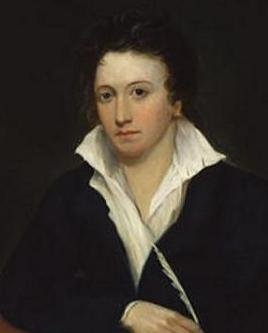
He lived between 1792 and 1822. It was characterized by attitudes of political rebellion and anti-religious, and a marital and paternal life a little dissipated. He left England and lived in Switzerland when he joined Mary Wollstonecraft Godwin (known as Mary Shelley) and then in Italy, where he drowned during a storm at the age of 30. She wrote a literary work of great emotional intensity, which includes reflection texts such as Defense of Poetry, but mainly poems of extraordinary beauty, where "To the Lark", "Hymn to Intellectual Beauty", "Liberated Prometheus" (dramatic poem) and "Mont Blanc" stand out among many. We read in the first: "Hail to thee, blithe spirit! / Bird thou never wert-/ That from heaven or near it / Pourest thy full heart / In profuse strains of unpremeditated art", and in the second: "Spirit of Beauty, that dost consecrate / With thine own hues all thou dost shine upon / Of human thought or form,-where art thou gone? / Why dost thou pass away and leave our state, / This dim vast vale of tears, vacant and desolate?". In his dramatic poem, the myth of Chained Prometheus serves to express the longing for freedom and transcendence by picking up the rebellion of the Greek titan against Jupiter, who is presented as a despotic god, an enemy of man. Critic Abrams, in interpreting Shelley's poem, says that "man is the agent of his own fall, the tyrant of himself, his own avenger and his own potential redeemer.
In "Mont Blanc", an ode to the great mountain of the French Alps, Shelley establishes a certain analogy between the immensity and power of the mountain with the human mind and imagination. He recognizes the strength of the universe in that, its overwhelming presence, in the face of man's loneliness and precariousness. We reproduce his fifth (and last) stanza:
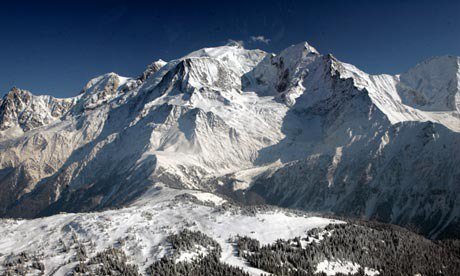
Mont Blanc yet gleams on high:-the power is there,
The still and solemn power of many sights,
And many sounds, and much of life and death.
In the calm darkness of the moonless nights,
In the lone glare of day, the snows descend
Upon that Mountain; none beholds them there,
Nor when the flakes burn in the sinking sun,
Or the star-beams dart through them. Winds contend
Silently there, and heap the snow with breath
Rapid and strong, but silently! Its home
The voiceless lightning in these solitudes
Keeps innocently, and like vapour broods
Over the snow. The secret Strength of things
Which governs thought, and to the infinite dome
Of Heaven is as a law, inhabits thee!
And what were thou, and earth, and stars, and sea,
If to the human mind's imaginings
Silence and solitude were vacancy?
(You can read the complete poem in this link)
The English Romantics cultivated verse, as we have already seen, but also poetic and narrative prose. Narrative prose, particularly the novel, gained much ground with romanticism in general; one could almost say that in romanticism, the novel acquires the definitive thrust of modernity.
It is known that the term "romantic", around the seventeenth century, had in its meaning the meaning of "as in old novels", because of its allusion to romances or chivalry stories; that fictitious, chimerical, "unreal novels" character seems to be transferred to romanticism at the end of the eighteenth and beginning of the nineteenth century; it is the romantic as an aesthetic feeling of nature, related to the charm of a world sunk in the distance of time (the medieval) and to the unusual in daily life (the medieval); it is the romantic as an aesthetic feeling of nature, related to the charm of a world sunken in the distance of time (the medieval) and to the unusual in everyday life. Thus, the novelty takes root. For this reason, Echo points out: "the romantic man lives his own life like a novel, dragged by the force of feelings he cannot resist". The "beauty of the novel" will emerge, as this author notes.
Lord Byron, between narrative poem and adventure

George Gordon Byron (1788-1824) was one of the few to achieve fame in his time. His physical attractiveness, his love affairs, his exile and his early death (at the age of 36) in the Greek War of Independence made him an emblematic romantic figure. From a very young age (1809) he undertook trips to Europe (Spain, Portugal, Albania, Turkey, etc.) and then in 1816 he left his country definitively, with stays in Switzerland, Italy and Greece. In Switzerland he befriended Percy and Mary Shelley and John Polidori, and it is said from their meetings that the narrative projects Frankenstein and The Vampire were conceived by the last two names. Byron is the author of a prolix work in which poems in verses, narrative poems in prose and dramatic poems are narrated. His experiences as a traveller and, of course, his libertine life had an important influence on his work. They can be highlighted: The pilgrimages of Childe Harold, The prisoner of Chillon, "The dream" (poem in verses), Manfredo (dramatic poem), Beppo, Mazeppa, Caín (dramatic poem) and Don Juan, inconclusive following his death.
Let's read a fragment of "El Sueño", a poem very representative of the romantic vision, which incorporates the dream as the central motif of literary creation:
Our life is twofold: Sleep hath its own world,
A boundary between the things misnamed
Death and existence: Sleep hath its own world,
And a wide realm of wild reality,
And dreams in their development have breath,
And tears, and tortures, and the touch of Joy;
They leave a weight upon our waking thoughts,
They take a weight from off our waking toils,
They do divide our being;[1] they become
A portion of ourselves as of our time,
And look like heralds of Eternity;
(You can read the whole poem by visiting the following link).
We cannot leave out the reference to an important text in Byron's work: *Don Juan. It is an extensive poem (a novel in verses for some) of satirical and ironic character, in which Byron recreates the legend of Don Juan, a character who had already appeared in the Spanish theater -Tirso de Molina- and French -Moliére- in the seventeenth century. Byron's Don Juan is a character who makes it possible to question the hypocrisy and norms of society, as well as to defend freedom and sensuality. Let's read a fragment from the beginning (in a prose version), where something of Byron's vision can be seen:
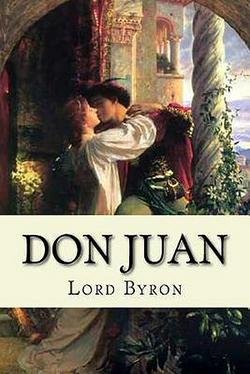
When John turned sixteen he was a tall, beautiful, a little feminine waiter perhaps, alive, strong, well-formed and arrogant; cheerful and unwrapped like a bird. How they saw him, except his mother, they looked at him already as you look at a man, but if one of them did. Doña Inés became angry and bit herself. lips nervous, scared to death, because the fact that John represented so graciously and so precociously the manhood, it turned out to be to be the most criminal thing in the world for her.
Among the many knowledge and friends of don Juan, all of them chosen for the prudence and careful devotion of their mother, there was a beautiful doña Julia, who was to call beautiful is mild justice. Her thousand charms were as natural to her as the scent is and the soft touch in the flowers, the salt in the Ocean, the whole of the beauty of Venus and the loving bow in the god Cupid. The color of ebony from his oriental eyes accredited the origin of the of his blood.
(…)
Doña Julia, of whom we will have much to talk about, she was beautiful, healthy, chaste. I counted twenty-three years old and was married. Her eyes were slanted and black, beautiful, but no but only a part of their fire. until she talked. Then, in spite of her sweet reserve, he let shine in his gazes one of the most pretty expression, rather arrogant than angry, which served to prove that love reigned. in that body and in that soul with the most decision than any other feeling. To such eyes you would surely see the desire if it were not because Doña Julia's will imposed on them silence with firmness. Her black hair is curled gracefully over a forehead whose sweetness had no equal, animated by the noble reflection of intelligence. The eyebrows formed a sweet curve, similar to the rainbow, low so pretty front; the cheeks, rosy with the incarnate of the youth and life, had sometimes as a a transparent aureole, as if a fire Suddenly and secretly circulates through his veins.
(You can read the full text at this link)
Mary Shelley, between a romantic gothic novel and science fiction
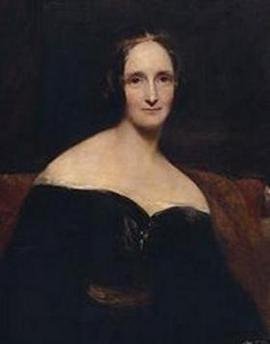
As we have noted, Mary Shelley (single Mary Godwin) is the author of Frankenstein or the modern Prometheus. A native of London, where she was born in 1797 and died in 1851, she made incursions into novels, dramaturgy, essays and biographies; she held political ideas and with respect to radical women, under the influence of her father and mother. From 1814 he had a love affair with the poet Percy Shelley, with whom he married in 1816. This year, while the couple were in Switzerland, during an evening at Byron's house, they devised the creation of the novel Frankenstein, which would be published in 1818.
Frankenstein is part of the tradition of the so-called "Gothic novel", whose conventional beginning is fixed in 1765 with The Castle of Otranto by Horace Walpole. This sub-genre of the considered terror narrative developed during the second half of the 18th and 19th centuries and, assumed by romanticism, was a mode of opposition to the prevailing rationalism. Its name derives from a renaissance of a taste for the Gothic, in other words, for the medieval, associated with castles and monasteries, to an iconography composed of cemeteries, ghosts, demons, vampires, etc.. In short, it is an aesthetic that vindicates the mournful and the funereal. As Eco says, "beauty can now be expressed by making opposites converge; so what is ugly is not denial, but the other side of beauty". And in this way we will reach the grotesque (but we'll leave that for when we talk about French romanticism).
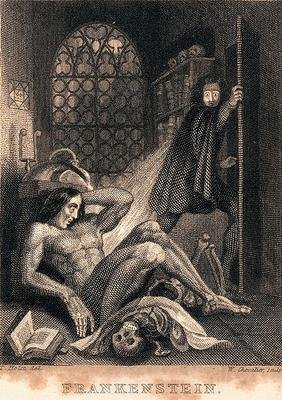
But also Frankenstein is somehow the initiator of science fiction. Let's remember her story: the young medical student Victor Frankenstein, obsessed with knowing the secrets of life, carries out an experiment in which he makes a creature of the union of parts of human corpses. This monster will take on a life of its own and commit various crimes as a way of expressing its hatred and revenge for the rejection of which it is the object. In an encounter with his creator, he manages to convince him that a companion believes him; Victor, who had agreed, destroys his new creation. The monster kills, among others, the fiancée of the young man, who decides to pursue him to finish with him, in this attempt, dies and the monster decides to end his own life.
We observe the conjunction of the elements of terror and science fiction, all within the framework of a vision touched by the romantic (his reference to the figure of Prometheus is no coincidence). In the introduction that Mary Shelley writes for the first edition we can read:
My imagination, unbidden, possessed and guided me, gifting the successive images
that arose in my mind with a vividness far beyond the usual bounds of reverie. […]
Swift as light and as cheering was the idea that broke in upon me. "I have found it!
What terrified me will terrify others; and I need only describe the spectre which had
haunted my midnight pillow." On the morrow I announced that I had thought of a
story. I began that day with the words, It was on a dreary night of November, making
only a transcript of the grim terrors of my waking dream.
(You can access the source of this text here)
And let's also read from the end of the novel, the image of that monster that romanticism "beautifies":
But it is true that I am a wretch. I have murdered the lovely and the helpless; I have strangled the innocent as they slept and grasped to death his throat who never injured me or any other living thing. I have devoted my creator, the select specimen of all that is worthy of love and admiration among men, to misery; I have pursued him even to that irremediable ruin. There he lies, white and cold in death. You hate me, but your abhorrence cannot equal that with which I regard myself. I look on the hands which executed the deed; I think on the heart in which the imagination of it was conceived and long for the moment when these hands will meet my eyes, when that imagination will haunt my thoughts no more.
(…)
Some years ago, when the images which this world affords first opened upon me, when I felt the cheering warmth of summer and heard the rustling of the leaves and the warbling of the birds, and these were all to me, I should have wept to die; now it is my only consolation. Polluted by crimes and torn by the bitterest remorse, where can I find rest but in death?
(You can go to the complete book by visiting the following link)
(There are numerous versions of Frankenstein's story taken to the theatre and cinema. Of the cinematographic versions it is highly recommended the one made by the English director Kenneth Branagh, in 1994, with Robert De Niro). Here's your trailer:
Bibliographic references:
Abrams, M.H. (1992). Romanticism: tradition and revolution. Spain: Visor.
Byron, Lord (1999). Selected works. Spain: Edicomunicación.
Eco, Umberto (2004). History of beauty. Spain: Lumen.
Jauss, Hans Robert (2000). Literature as provocation. Spain: Peninsula.
English romantic poets. Anthology. (1999). Spain: Planeta.
Shelley, Mary (1971). Frankenstein or the modern Prometheus. Spain: Montesinos.
I hope that the information shared in this post will be of use and interest to you, dear @adsactly readers, to whom I thank for your kindness in publishing it. He was an important writer of English language, although not English but North American, of romantic affinity; I am referring to the great Edgar Allan Poe. We are in another issue soon, which will be about French romanticism. Greetings.
Authored by @josemalavem
Click on the coin to join our Discord Chat

Witness proposal is here:
Go To Steem Witness Page
In the bottom of the page type: adsactly-witness and press vote.

Use small letters and no "@" sign. Or, click here to vote directly!
Thank you!
It’s been a nice surprise to find an article on my favorite literary moment in history written by you, @josemalavem, an essay author whom I most admire. These troubled people made awesome writers; and although most romantic theses are, well, romantic, what they inspired is a balm for the soul.
Among all the great works you refer to and so gracefully comment on, I want to say something about young Marie Shelley’s Frankenstein. This is still one of my favorite novels in the world because of its gothic atmosphere and its archetypal baggage. Although reputed critics state that it is in fact a Ci-Fi igniter in the Western literary tradition, I think of the scientific experiment as a motif instead of the cornerstone of the argument. None of the three narrators offers any details about galvanism, for instance; instead, throughout the novel science is viewed as something obscure and scientists, accursed. What is more romantic than that! (love it).
The thesis of a world the novel discusses is the same as in the myth of Prometheus, who stills fire/knowledge(/life?) from Zeus/God/Father and gives it to men, and then is punished/exiled/crushed. It is about the eternal yearning of humans to know our Creator. It is about free will and its consequences. It is really an amazing work. I think this young author played with powerful archetypal notions (man playing God, the quest for origin…) and even Freudian (the annihilation of the Father, e.g.), her ingenuity never being appreciated fairly—not even by her own husband, which we can confirm by reading the preface he wrote for the first edition of her book).
I like to have my students read the Jewish legend of the Golem, the myth of Prometheus, and also about Adam and Eve and the other references in the book (the works read by Frankenstein’s monster-son) because I they learn that even the romantics had to be learned people if they wanted their works to meet the public eye and survive the test.
All in all, British romanticism is the cradle of amazing literature.
Thanks a lot for bringing this to the table today. Just delicious.
Excellent commentary on the romantic implications of Mary Shelley's Frankenstein, @marlyncabrera! I would have liked to expand a little more on his work, but as they are very basic and informative articles, it is not enough. Indeed, there is a very daring view in the author using the analogy with Prometheus (which also speaks of her cultural reflection), which appears to challenge the god himself (in Percy Shelley's work there is something of that as well). There would also be much to be said about the "romanticization" of the monster. Thank you for your contribution. Greetings.
Very good work, @josemalavem. I must admit that of the authors you have named, my favorite is the super adored and read Lord Byron. Not only his work, rich and delicious for analysis, also his personal life, ambiguous, loving, scandalous that led him to be a legend. On the one hand, his fame of Don Juan as his work, and on the other, his bisexuality, which some behementally deny. It said in that poem "Alcumplir mis 36 años:
Thank you for your excellent work and @adsactly for sharing.
Without a doubt, Byron is a romantic figure, as a writer and as an individual; he became a character himself; having been the creator of many of his works, he became a fictional entity in some way.
I appreciate your emotional and insightful comment, @nancybriti. Greetings.
Very excited I read this II part of English Romanticism because the first one I loved. I confess that I have read very little English literature, possibly several classics. All the references you make of the writers is very illustrative. I pay attention to the quote quote from Abrams when interpreting a poem by Percy Shelley "man is the agent of his own fall, the tyrant of himself, his own avenger and his own potential redeemer." It seems to me that the whole quote contains the characteristics of English Romanticism.
On the other hand, in spite of how popular Byron could be for his narrative, my favorite is Mary Shelley and her work Frankenstein. I confess to me as a reader and re-reader of this wonderful Gothic novel. For me he has everything. And Eco's quote about Shelly is spectacular: "Beauty can now express itself by making opposites converge, so what is ugly is not negation, but the other side of beauty." It reminds me a lot of Rodin about his perception of beauty.
Very nice your post @josemalavem. Best regards and thanks for sharing @adsactly
Thank you for your attentive reading and your sharp comment, @marcybetancourt. You highlight two quotes that also seem very relevant to me. Among several of the contributions that we must recognize to romanticism, and to English in particular, is this rupture with the dualist, Manichean vision, which allowed us to see other faces of things, which made possible a less closed and dogmatic vision. Greetings.
A beautiful publication, @josemalavem, to remember those classic authors who amazed us and enlightened us in our youth. It is propitious the occasion to return to look for his works and to enter again in that kingdom where the fantasy and the romanticism had their seat.
Although I should reread these works, I admit, you refer in your magnificent work, I want to mention here Mont Blanc (the highlight of the European orography in correlation with the greatness of human thought), beautiful piece of universal poetry that filled me of joy in those moments when he climbed reading his verses the physical and spiritual heights.
I would like to contribute, with your permission, showing the first stanza of the poem:
Thank you, @josemalavem, for contributing with this beautiful essay to undo a bit the snow that ruthless time has accumulated in my memory.
And, of course, thanks also to @adsactly for disseminating it.
Grateful for your reading and affectionate comment, @oacevedo. The poets of English romanticism are key figures of modern literature, and among them, undoubtedly, Percy Shelley with his "Mont Blanc". It is a very beautiful poem. Thank you for placing the first stanza. I transcribed the last one because it seems to me that it sums up the global vision of the lyrical speaker. Greetings.
Excellent work, @josemalavem, very interesting and educational. The reference you make to the romanticism authors highlighted in this publication is very complete.
From romantic poetry, I like the verses of the poem ***Mont Blanc by Shelley that you quote and "The Dream" by Lord Byron. I'll read the poems!
Now, with this statement of yours: "Frankenstein is somehow the initiator of science fiction", you have led me to look for the reading of this work that I have postponed several times, because one of my New Year's resolutions has been to read a little more science fiction, and I will take the suggestion to see the film, although for that I have to prepare myself, is not the films that I like to see. Thank you for this quality article and @adsactly for spreading it.
Grateful for your reading and comment, @aurodivys. "Mont Blanc" and "The Dream" are magnificent poems; the versions I refer to are the original ones, in English, but can be obtained in Spanish. *Frankenstein, Mary Shelley's novel, is a literary jewel and an excellent copy of the Gothic novel that should be read. It can be considered among the initiators of the science fiction narrative because it is the monster product of biological experiments with electrical applications. There was indeed a scientist by the name of Andrew Crosse, who had done such experiments and whom Shelley knew. Branagh's film version is very good (the ones I've seen; there seems to be a more recent one I don't know). Greetings.
Posts that are very enlightening and educational.
The sentence in literature is so beautiful, both poetry and prose. Shows how the author animates what he wants to greet. But behind all that I feel there is a sense of alienation, or want to reach a high level so that it feels far from the noise of the world. When reading Mount Blanc and Frankestein I feel the feeling. Can you see it too?
From all of my writers, they felt they were shedding feelings of funding scientific thinking and combining with imagination so that unusual works were born. a moment of imaginary discovery and scientific knowledge.
thank you @josemalavem
Thank you @adsactly
Thank you Steemit
warm greetings from Indonesia
My gratitude for your interesting reading, @rokhani. Since romantics, poetry and prose are not two separate textual genres; they demonstrated that poetry can be made from prose (hence the "poem in prose").
I believe that in romanticism there is an attempt at estrangement from the world of statues, as well as the search for a re-enchantment of the world, for a return to a reconciling gaze. this implied a critique of the dominant rationalism, a certain scientism.
Greetings.
great Job bro
i appreciate for your Works
@usahil must see my last post
Grateful for your appreciation, @usahil.
Hi, @adsactly!
You just got a 0.54% upvote from SteemPlus!
To get higher upvotes, earn more SteemPlus Points (SPP). On your Steemit wallet, check your SPP balance and click on "How to earn SPP?" to find out all the ways to earn.
If you're not using SteemPlus yet, please check our last posts in here to see the many ways in which SteemPlus can improve your Steem experience on Steemit and Busy.
Wonderful
Narrative prose, particularly the novel, gained much ground with romanticism in general; one could almost say that in romanticism, the novel acquires the definitive thrust of modernity.
https://allboardresults1.webs.com/apps/blog/show/46074718-bise-lahore-board-5th-class-result-2019-pec